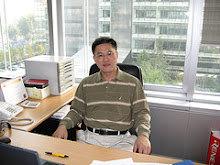 Buried among news of presidential election and a historical financial government bailout of the failing financial market is that successful space walk by 3 Chinese kaitonauts. China is now the third country capable of sending people to walk in the space. After hosting a summer Olympic game, Shenzhou 7 spaceship’s successful launching and recovery will boost the Chinese national pride to a new height. Congratulations to the Chinese people!
Buried among news of presidential election and a historical financial government bailout of the failing financial market is that successful space walk by 3 Chinese kaitonauts. China is now the third country capable of sending people to walk in the space. After hosting a summer Olympic game, Shenzhou 7 spaceship’s successful launching and recovery will boost the Chinese national pride to a new height. Congratulations to the Chinese people!There are no shortages of comments on the Chinese media and web chat rooms on the significance of this achievement. True, a human spacewalk helps covering up the bad publicity of an outburst of tainted baby milk powder; it has the potential of enhancing China’s military power; it helps creating thousands of new business and jobs. Out of the many possible impacts, one stands out is the people -- thousands upon thousands of young people who worked directly or indirectly on the space program. Right before launching, on Saturday (9/21/08), the official Chinese news agency – Xinhua released a picture on the 7 commander and deputy commanders. Their average age of this crew is only 45. Gone are the people in their 70th from the first 3 Shenghou launches in the past 5 years. From this news, we can further extends the majority of the Chinese space program is made of people in their 40th or younger. At this young age, the Chinese space program will have a bright future.
One may wonder what happens to those in their 50th and 60th? Giving posts directly to people 20 years younger of their average age must have by passed many age groups in between. China is a society that has a history of emphasizing the order of age. The truth in today’s China is that there are not many people in that age range to be passed by. People in those age groups are simple absent on the high tech working places. Growing up during ‘the Great Cultural Revolution, they squandered their best times in life playing Chairman Mao’s Red Guards or doing the manual labor in the countryside. Chinese universities were either engaged full time in political turmoil or simply closed during the 1960s and 1970s. Many people praise the Chinese communist party and government with China’s space program citing only with this kind of power concentration that China may get the kind of success. They missed to see that United States has had a successful space program for a long time. They also failed to notice that the flip side of unchecked power concentration is havoc. If the few individuals in top power decide to do wrong things, there will be very little the rest of the country can do to stop them. In 1950s, 1960s and 1970s, up to 3 generations of people were sacrificed for one top person’s personal ambition to become a world revolutionary leader. When Chairman Mao died in 1986, the country economy was on the verge of collapse. Millions upon millions of people did not have enough to eat.
In June 1989, there was a pro-democracy movement in Tiananman square led by college students. That movement was squashed in cold blood. Since that time, the Chinese communist regime adapted a historical compromise with the people. It stopped all ideology maneuvering and focused, instead, on developing the national economy. The ‘opening up to the world reform’ has brought about unprecedented economic prosperity and social freedom to tens of millions Chinese people. I applaud those changes while also believe the Chinese people deserve much more. Along with the economic advancement, the Chinese Communist Party should start political reforms. It is high time for the ordinary Chinese citizens to know the inner circle of government operations; it is high time for the ordinary Chinese citizens to be given back their citizen’s rights to participate in the national political process. Once knowing that the Chinese space programs have been endorsed by the Chinese tax payers, people in rest of the world will cheer for China’s spacewalk with whole hearts.

No comments:
Post a Comment